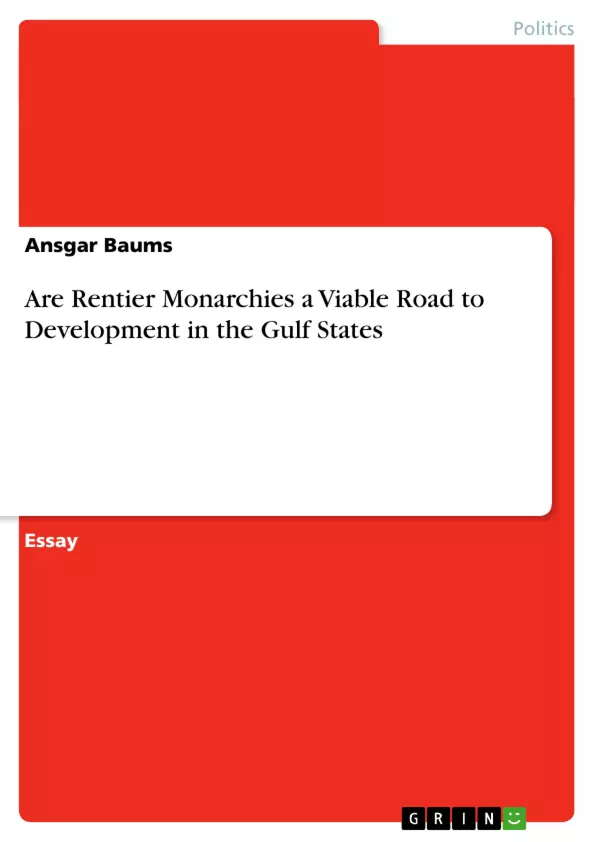What must go wrong before economists label a scarce and strategically valuable commodity like oil a “curse”? Fundamental economics suggests that they are almost as good as cash. Abundant natural resources can help a country prosper through earnings of hard currencies, larger and diversified domestic investments in physical and human capital, and acquisition of foreign technology. Furthermore, despite attempts to diversify the energy portfolio, oil still is the world’s most important energy source. Nevertheless, when BBC launched the TV series “The Curse of Oil” in September 2004, no incident of protesting economists became known. This might be due to another lesson from history, namely the “natural resources paradox”: Oil – or natural resources in general – might not exactly be “as good as cash”. Rather, they could have negative impacts on the development of an economy, i. e. a process towards a stable, sustainable and diversified economy. The most obvious example of the natural resources paradox are conflict-ridden countries like Nigeria. Analysts argue that natural resource abundance is one of the reasons for destructive political conflicts. But even politically stable countries, which enjoy a high GDP per capita due to the exploitation of natural resources, show a negative correlation between oil and development. An obvious example of this is the performance of the member countries of the Gulf Cooperation Council (GCC). On the one hand, all of these oil monarchies enjoy a high GDP per capita (cf. figure 1).
Inhaltsverzeichnis (Table of Contents)
- INTRODUCTION
- HOW COULD OIL BE A CURSE?
- QUESTION AND THESIS
- THE OIL CHALLENGE
- Theoretical Background
- The Failure of “Big Push” Theories
- The Rentier State Theorem
- State-Sector
- State-Dominance
- Protectionism
- Corruption
- Private Sector
- Unbalanced Investments
- Rent-Seeking Behaviour
- Deficits in Human Capital
- State-Society Relationship
- Lack of Accountability
- Lack of Modernisation
- CONCLUSION
Zielsetzung und Themenschwerpunkte (Objectives and Key Themes)
This essay seeks to investigate the relationship between natural resource abundance and economic development, specifically focusing on the case of oil-rich Gulf states. It aims to address the question of whether rentier monarchies, heavily reliant on oil revenues, can achieve sustainable and diversified development.
- The "Natural Resources Paradox" and its application to oil-rich economies.
- The impact of oil abundance on economic structure and diversification.
- The role of the rentier state in shaping economic outcomes and development.
- The influence of oil on political stability and societal dynamics.
- The challenges and opportunities for sustainable development in the Gulf states.
Zusammenfassung der Kapitel (Chapter Summaries)
INTRODUCTION
The introduction begins by exploring the notion of oil as a "curse" rather than a blessing for economic development, highlighting the "natural resources paradox." This paradox suggests that abundant natural resources can hinder sustainable development, particularly in countries like Nigeria where resource wealth has fueled conflict. The introduction then presents the Gulf Cooperation Council (GCC) countries as examples of economies with high GDP per capita but varying development outcomes, demonstrating a potential correlation between oil abundance and development performance.
THE OIL CHALLENGE
This chapter delves into the theoretical background of the oil challenge, examining the failures of "Big Push" theories and introducing the "Rentier State Theorem." It then explores the impact of oil wealth on the state and private sectors, including: state dominance, protectionism, corruption, unbalanced investments, rent-seeking behavior, and deficits in human capital. The chapter concludes by analyzing the state-society relationship in oil-rich states, highlighting the challenges of accountability and modernization.
Schlüsselwörter (Keywords)
Key concepts and terms explored in this essay include: rentier state, natural resource paradox, oil abundance, economic development, diversification, sustainable development, state dominance, rent-seeking, human capital, state-society relationship, Gulf Cooperation Council (GCC), and development performance. This analysis focuses on understanding the relationship between oil wealth and the capacity of rentier monarchies to achieve sustainable and diversified development.
Frequently Asked Questions
What is the "Natural Resources Paradox"?
It suggests that abundant natural resources like oil can hinder economic development, leading to political conflict or unstable, non-diversified economies.
What is a Rentier State?
A state that derives all or a substantial portion of its national revenues from the rent of indigenous resources (like oil) to external clients, rather than from domestic taxation.
Is oil a "curse" for the Gulf States?
While Gulf states have high GDP per capita, oil abundance can lead to state dominance, corruption, and a lack of economic diversification, which some economists label as a curse.
How does oil wealth affect the private sector in GCC countries?
It often leads to rent-seeking behavior, unbalanced investments, and deficits in human capital development as the economy remains over-reliant on the state sector.
What are the challenges for sustainable development in oil monarchies?
Key challenges include a lack of political accountability, the need for modernization, and reducing the heavy reliance on a single volatile commodity.
- Citation du texte
- Ansgar Baums (Auteur), 2004, Are Rentier Monarchies a Viable Road to Development in the Gulf States, Munich, GRIN Verlag, https://www.grin.com/document/38742



